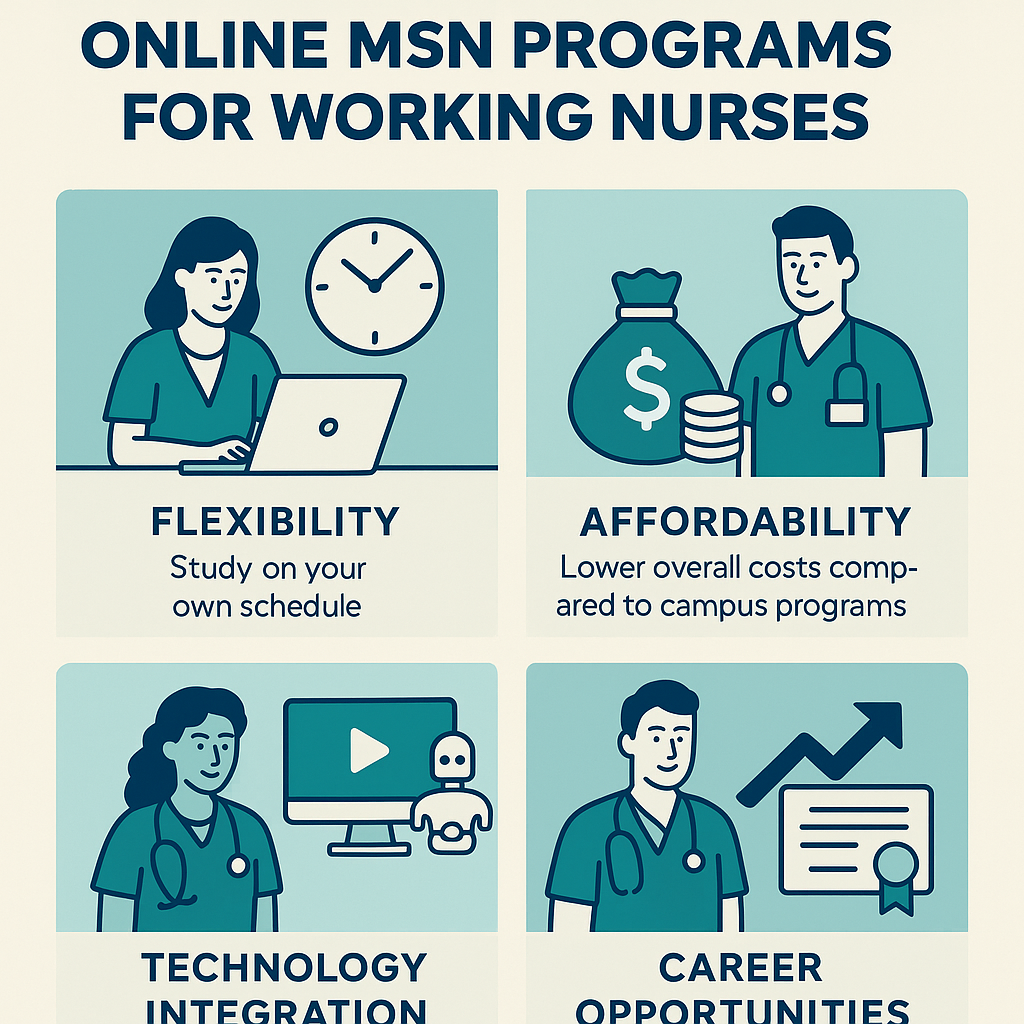Introduction
Balancing work, family, and pursuing higher education is a daily challenge that countless nurses who aspire to advance their careers face. The evolving demands of the healthcare sector make lifelong learning essential, but many find that traditional educational avenues clash with their busy schedules and responsibilities. However, thanks to the rise of online MSN degrees, nurses now have a more accessible and convenient means of pursuing a Master of Science in Nursing. These online programs break down the barriers once associated with higher education, letting committed nurse professionals reach their academic milestones without abandoning their positions, reducing working hours, or sacrificing valuable time with loved ones.
Online MSN programs are specifically designed to address the realities faced by today’s working adults. Whether you prefer to study late at night after a demanding shift, early in the morning before commuting, or whenever time permits between family obligations, these programs meet you where you are. The flexibility inherent to online coursework means that even those with the most demanding clinical schedules and personal commitments can realistically pursue advanced education and professional development.
Flexibility and Convenience
The cornerstone of online MSN programs is their unparalleled flexibility. Rather than adhering to a rigid on-campus schedule that requires attending lectures at set times, students enrolled in online programs can engage with course materials, join class discussions, and complete assignments when it best fits their lifestyle. This is particularly valuable for nurses who work rotating or overnight shifts and those juggling an already-packed home life. The structure of online learning addresses and eliminates many of the conflicts that deter nurses from returning to school in the first place.
Courses in these programs are often asynchronous, meaning there isn’t a required time for all students to connect live. As a result, learners have greater control over their pace of progress. The ability to pause, rewind, or revisit lectures and class materials whenever necessary enhances comprehension and retention. This self-paced model also reduces the anxiety associated with falling behind. Beyond that, many online MSN programs feature rolling admissions cycles, so prospective students can apply and start classes several times throughout the year, minimizing the wait between deciding to pursue the degree and getting started. U.S. News & World Report reported that this flexibility and convenience are primary factors driving many working professionals to select online education over traditional options.
The flexibility doesn’t end in the classroom. Online MSN programs also grant nurses the freedom to manage their own study environments—whether learning from the comfort of home, a quiet break room, or even while traveling—making it much easier to blend academic and professional life.
Cost-Effectiveness
Pursuing an online MSN degree is often more affordable than traditional, campus-based education paths. Students who enroll in online MSN programs sidestep many of the ancillary costs that can make returning to school prohibitively expensive, including daily commuting expenses, parking fees, or the cost of relocating to be near a campus. On top of that, campus-based fees related to facilities or student services may be reduced or nonexistent. Many universities with online offerings are keenly aware of the budget constraints many adult learners face. As a result, they structure their tuition to be as cost-effective as possible. Some offer flat rates regardless of residency, while others offer special pricing for in-state and out-of-state students.
One of the most significant financial advantages, however, comes from the ability of working nurses to maintain their current jobs without interruption. Rather than taking a leave of absence or reducing hours (and income) to accommodate a traditional class schedule, online learners can continue supporting themselves and their families, all while investing in their future. According to reporting from the New York Times, the savings from online education extend far beyond tuition, encompassing everything from travel expenses to the cost of meals and housing. This allows nurses to maximize their return on educational investment, minimizing debt while developing skills that actively increase their professional value.
For many, these financial benefits tip the scales, making an advanced degree attainable when it might otherwise have been out of reach.
Access to Diverse Specializations
Today’s healthcare landscape is characterized by rapid advancement and increasing demand for nurses with specialized knowledge. Online MSN programs cater to this shift by offering a broad range of concentrations—whether you’re interested in becoming a Family Nurse Practitioner, specializing in Adult-Gerontology Acute Care, or pursuing a path in Nurse Leadership, Nurse Education, Informatics, or Public Health. Each specialization is precisely structured to align with personal career aspirations and the current needs of diverse communities.
The ability to choose from different career tracks means you can hone specific clinical, educational, or administrative skills and emerge uniquely qualified for roles that may not even exist in traditional MSN curricula. Furthermore, many online programs are committed to curricular innovation, using input from industry leaders and healthcare organizations to regularly update courses and respond to policy, technology, and care delivery model changes. This ensures graduates are relevant to present-day healthcare and poised to lead in emerging fields.
By tailoring your education to suit your interests and your community’s needs, you can make a bigger impact, helping address shortages and elevating care across all settings.
Integration of Technology in Learning
Modern online MSN programs leverage cutting-edge educational technology to create dynamic and interactive learning experiences. The days of simply reading from textbooks have given way to engaging virtual simulations, digital case studies, and interactive multimedia modules. Students participate in realistic clinical scenarios, gaining exposure to complex decision-making and interdisciplinary collaboration before ever stepping foot in a simulation lab or clinical site. This immersion solidifies critical theoretical knowledge and ensures that nurses are prepared for the realities of clinical practice.
Programs also use advanced learning management systems (LMS) to organize materials, assessments, and communication, streamlining the learning process and ensuring easy access to faculty and peers. Some even incorporate virtual labs and telehealth training, giving students hands-on experience in the tools and systems shaping modern healthcare delivery. Beyond enhancing learning, these technological integrations prepare nurses to confidently use electronic health records, data analysis tools, and telemedicine platforms, which are increasingly central to patient care, hospital administration, and population health management.

Supportive Learning Environment
Contrary to the assumption that online learning is isolating, online MSN programs foster a robust sense of community and collaboration. Through participatory virtual discussion boards, engaging group projects, and regular video conference sessions, students can form meaningful connections with peers and instructors who share their professional goals. Faculty are typically seasoned professionals dedicated to supporting their students, offering one-on-one mentorship, timely responses to questions, and regular assignment feedback.
This digital community enriches the learning experience and builds a network of professional contacts that persists beyond graduation. Many online MSN programs offer alumni support, exclusive networking opportunities, and ongoing professional development resources, ensuring that students and graduates receive value from their alma mater long after earning their degrees. You will find that help and encouragement are only a message or video call away at every step.
Career Advancement Opportunities
An online MSN can significantly reshape a nursing career, creating pathways to advanced practice opportunities. Graduates may qualify for roles such as Nurse Practitioner, Clinical Nurse Specialist, Nurse Educator, or Nurse Administrator. Programs offered through Arkansas State University illustrate how advanced education equips professionals with the skills needed to expand autonomy, enhance earnings, and positively impact patient care and healthcare systems.
Importantly, employers increasingly value online MSN programs, viewing them as rigorous and comprehensive—provided they come from accredited institutions. As such, graduating from an online program equips nurses with competitive credentials recognized throughout the healthcare industry. Whether you aim for a leadership role, wish to specialize in a high-demand clinical field, or plan to transition to teaching or healthcare policy, an online MSN creates new possibilities for career mobility and professional distinction.
Conclusion
Online MSN programs are more than a convenient alternative—they represent a modern, responsive solution for nurses with big ambitions and busy lives. By combining flexible scheduling, cost-effective learning, varied specialization options, and technology-enhanced study, these programs empower nurses to learn, lead, and innovate within an ever-changing healthcare environment. Investing in an online MSN allows today’s nursing professionals to achieve their educational and career goals while continuing to serve patients, support their families, and shape the future of healthcare on their own terms.









